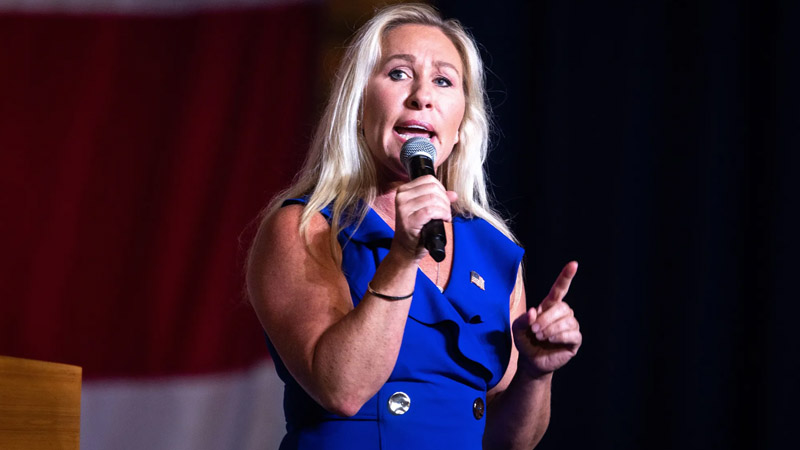Marjorie Taylor Greene Faces Political Isolation After Misstep in Congress

(Arvin Temkar/The Atlanta Journal-Constitution/TNS)
Representative Marjorie Taylor Greene (R-GA) seems to have miscalculated her influence in the House, leading to a significant setback as she attempted to block a substantial $95 billion foreign aid package. The bill passed despite her vehement objections, suggesting a possible decline in her sway within the House.
This scenario unfolded during what has been described as the worst week of her political career, an analysis detailed by Michelle Cottle of the New York Times in a recent column. Greene’s aggressive stance and threats to derail the foreign aid package did not yield the intended results.
That is the opinion of the New York Times’s Michelle Cottle in a column in which she claimed Greene just had the worst week of her political career, culminating in Donald Trump siding with House Speaker Michael Johnson on the bill and subsequently leaving her “flapping and flailing.”
“She has, in very little time, undermined the influence of her party’s entire right flank, driving less unhinged Republicans — most notably the House speaker, Mike Johnson — to brush back her and her ilk like the poo-flinging chaos monkeys they are,” Cottle wrote, before opening, “I may be off base here, Marjo, but trashing your colleagues as no better than the other side in a high-stakes election year is not the best way to win them over to your kamikaze mission.”
Instead, it led to her biggest supporter, Donald Trump, aligning with House Speaker Michael Johnson in favor of the bill. This alignment between Trump and Johnson marks a notable shift in alliances and leaves Greene increasingly isolated. Her response to this development was one of visible frustration and desperation, described vividly as “flapping and flailing” in the face of political defeat.
This series of events not only signifies a personal blow to Greene but also indicates a broader impact on the far-right faction within the House. Her failure to influence the outcome of the bill and the visible shift of support away from her by key political figures, including members of her own faction, has exposed her vulnerability. Observers like Cottle argue that this could be the beginning of a rapid decline in Greene’s political capital and influence within the House.
Greene’s actions have also catalyzed a reevaluation among her colleagues and supporters, with some feeling the need to distance themselves from her increasingly controversial tactics. This distancing is particularly poignant given the contrast between her promises to block the bill and the ultimate ease with which it passed, showcasing her dwindling leverage in legislative matters.
“More food for thought, congresswoman: When Russian propagandists start praising your politics and beauty, it’s time to rethink your life choices,” she wrote, adding, “I mean, not even Donald Trump is throwing in with ‘Moscow Marjorie,’ as she has been dubbed in some cheekier conservative corners.”
As the dust settles on this legislative conflict, the consequences for Greene’s career are becoming apparent. Her attempts to wield power through intimidation and threats have, this time, backfired, leading to a stark and public display of her reduced standing among her peers. This event could potentially mark a turning point, signaling a shift in the dynamics within the House, particularly among the far-right members, and possibly heralding a decrease in the influence of the most extreme elements of the party.


